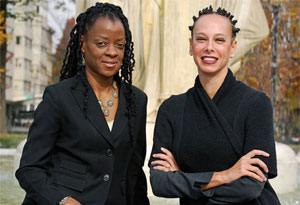Taking a Stand Against Sex Trafficking

Photo: Shakira Washington
The founders of the Rebecca Project help vulnerable women and girls speak truth to power.
Sitting in her Washington, D.C., office last spring with two victims of sex trafficking, Malika Saada Saar could barely believe what she was hearing. "They described how they had been sold on Craigslist," says Saada Saar, founder of the Rebecca Project for Human Rights. "At that moment, I committed to do everything I could to end this." In the months that followed, the Rebecca Project arranged for victims to speak before members of Congress, meet with the vice president and attorney general, and write open letters to Craigslist's founder. By fall the site's lucrative "adult services" section had disappeared.The Craigslist shutdown is the most high-profile victory yet for a nonprofit that grew from an unlikely friendship. In 1998 then–law student Saada Saar was teaching a writing class in a drug treatment program geared toward women with small children—among them Imani Walker, a single mother of four who was battling crack addiction. "I was struck by Imani's poise and confidence," recalls Saada Saar. "The other mothers clearly perceived her as a leader." Saada Saar asked Walker to speak before the Senate Finance Committee in support of family-based drug treatment. "Lawmakers were creating policies that affected our lives," Walker says, "but they'd never sat down and talked to us."
To keep that conversation going, Saada Saar and Walker started the Rebecca Project, which advocates for women and girls who have faced abuse, addiction, or incarceration for nonviolent (usually drug-related) offenses. Over the past seven years, Rebecca has helped secure more than $200 million in federal funding for family-based rehab programs and fought successfully to ban the shackling of pregnant federal inmates during labor. Their next goal: saving 20,000 girls from trafficking by 2012—and bringing survivors to Capitol Hill. "There's a healing that comes," says Saada Saar, "when women and girls feel as if they're no longer forgotten or invisible."
Want to Make a Difference?



